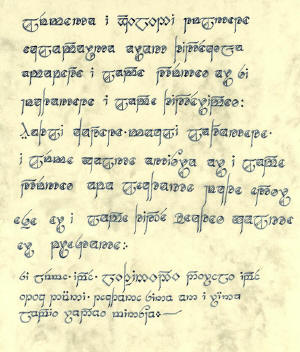I lambi yåri - I laim ioer
Lothenon's account in Old and Middle Sindarin
by Florian 'Lothenon' Dombach
![]()
These are Florian Dombach's Old Sindarin and Middle Sindarin translations and tengwar transcriptions and a full legend of all words used in this short text written by a fiction character Lothenon. Lothenon is a scholar, writer and poet and so has some knowledge of the ancient tongues and wrote this little text for...well, it's all in the text itself :)
About the Middle Sindarin version Florian wrote: As I looked the Old Sindarin version I felt the need to also translate it 1:1 to Sindarin and then chose to try it in Middle-Sindarin (or what we call so) and after looking at Daniel Andries' fantastic artwork again I decided to write it in his gothic style of Tengwar too.
Below we present both texts and both tengwar transcriptions.
![]()
Old Sindarin text:
Lūmena i ñgolodi tulnete ekla-mbarna aran Thindekollo abapente i lambe ndūneo ar si yukthanete i lambe thindērimbeo.
Hyathli khantete, makli lanthanete, i lūme galne aniåra ar i lambe ndūneo apa lekthane yukthe endoresse ar i lambe thindē wektheo galne ar prestane.
Si-lūme imbē, Lotthinondo ndorelo imbē otok duini, tekthane sina an i rīna lambio randao minåya.
Lûna i
ngœlydh dœllir na Eglamar aran Thingol avabed i lam annûn ar si iuithanner i
lam Thindrim.
Heithl
channer, meigl lanner, i lû ghalant eniaur ar i lam annûn aba-leithant iuith
mi ennor
ar i lam en-gwaith thind ghalant
ar prestant.
Si-lû im, Lothenon o ndôr im duin odog, teithon hen adh rîn e-laim andrann mhinui.
English translation:
'As the Noldor came to Beleriand king Thingol forbade the tongue of the west and they now used the tongue of the grey-elves.
Axes broke asunder, swords fell, the time grew older and the tongue of the west completely lost usage in middle-earth and the tongue of the grey people grew and changed.
Today I, Lothenon from the land between the seven rivers, write this for the remembrance of the languages of the first age.'
Old Sindarin tengwar transcription:
Florian writes about his old Sindarin transcription into Tengwar: Mainly I use the phonemic mode Tolkien used for English but I also used upper-and-lower-length-tengwar for breathed stops, andaith for long vowels and the curl-tehta opened to the right for opening vowels. I imagine this to be a phonetic elvish mode to write foreign languages; kind of an elvish IPA of younger periods than the First Age. (I do not expect Tolkien meant that, it's just a personal thing for LARP).
Middle Sindarin tengwar transcription:
Florian Dombach used here Daniel Andries' gothic style of tengwar.
lūmena
- as | lit. ´at the time´: lūme - time, -na
- allative (< Q -nna and suffixed na in Mature S “Tuorna”
- to Tuor)
i – definite article (< S and Q)
ñgolodi - Noldor (sg. ñgolodo)
tulnete - came | tuli- -
to come, -ne – past tense, -te – they (< Q -ntë
[and CE –te])
ekla-mbarna
- to
Beleriand | ekla-mbar – Beleriand
aran – king
Thindēkolla - Thingol |
made up from Thindē-kolla (> S thind coll >
Thingol)
abapente - forbade | abapet-
- to forbid (< Q váquet- - to forbid/refuse [> S
?avabed-]), abapente - he came
lambe – tongue
ndūneo - of the west | ndūne
-
west
ar
– and
si - now
yukthanete - they used |
yuktha- - to use
thindērimbeo - of the
grey-elves | thindērimbe - grey-elves (from S
Thindrim)
hyathli
- axes (sg. hyathla)
khantete
- (they)
broke asunder | khat- - to break (< Q hat-)
makli - swords (sg. makla)
lanthanete - (they)
fell | lantha- - to fall
galne - (it) grew | gala-
- to grow
aniåra - older | yåra -
old
apa - completely | < Q aqua
lekthane - (they)
lost | lektha- - to loose (< Q lehta-)
yuktha – usage
endoresse - in middle-earth |
endore - middle-earth, -sse –
locative
thindē -
grey
wektheo – of the people
| wekthe – people
prestane
– (it) changed | presta – to change (lit.
to affect)
si-lūme – today | si –
now, lūme – time/occasion
imbē – I
Lotthinondo – “Lothenon”
| name: “the blossoming” (S) (loth [blossom] >
lothen [of blossom]> lothenon
[the one who is...]) rebuilt to OS lotthe >
lotthina > lotthino(ndo)
ndorelo – from the land | ndore
– land, -lo – ablative (< Q –llo) Maybe rather
aud ndore?
imbē – between
otok – seven
duini
– rivers | sg. duine
tekthane – (I) write
| tektha- - to write, -ne
- I
sina
– this
an – for
rīna
– remembrance
lambio – of the languages |
lambi – languages (sg. lambe) Just suffix the genitive –o?
randao
– of the age | randa – age
minåya – first | reconstructed
after S minui (min-ui): minē-åya
lûna -
as
(lit. 'at the time') | lû + suffix na (s. S Tuorna,
na Duor)
avabed- - forbid | <Q vaquet-
hanner - they broke asunder | *had-
- to break asunder <Q hat-
lanner - they fell | lanna-
- to fall< Q lanta- u. S. lant
aba - completely | Q aqua > OS
*apa > (M)S *aba
leithant - it lost | *leitha-
- to loose;Q lehta > OS *lektha- > (M)S *leitha-
(s. also leithia- - to release)
![]()

